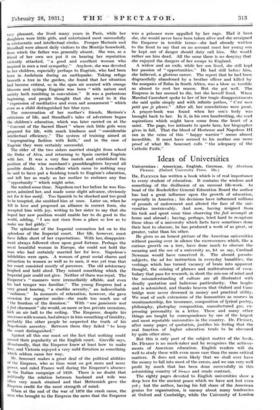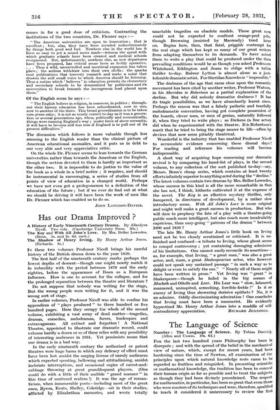Ideas of Universities
Universities : American, English, German. By Abraham Flexner. (Oxford University Press. 16s.)
DR. FLEXNER has written a book which is of real importance to every student of education. It contains the wisdom and something of the disillusion of an unusual life-work. As head of the Rockefeller General Education Board the author has had a great influence upon the growth of education, especially in America ; his decisions have influenced millions of pounds of endowment and altered the face of the uni- versities irretrievably. And now, having resigned from his task and spent some time observing the fait accompli at home and abroad ; having, perhaps, tried hard to recapture those ideas of a university which facts have sometimes done their best to obscure, he has produced a work of as great, or greater, value than his other.
He gives us an honest picture of the American universities without passing over in silence the excrescences which, like a curious growth on a tree, have done much to obscure the meaning and the use of a university as, let us say, Cardinal Newman would have conceived it The absurd pseudo- subjects, the ad hoc instruction in everyday banalities, the verbiage which has turned vacancy of brain into apparent thought, the coining of phrases and maltreatment of voca- bulary that pass for research, in short the mis-use of mind and the misunderstanding of culture are all illustrated with deadly quotation and ludicrous particularity. One laughs and is astonished, and thanks heaven that Oxford and Cam- bridge were never drowned in money and practical utility. We read of such extensions of the humanities as courses in scoutmastership, fire insurance, composition of lyrical poetry, philosophy, photoplay composition, manufactured gas, ex- pressing personality in a letter. These and many other things are taught by correspondence by one of the largest and most reputable universities in the 'country. Dr. Flexner, after many pages of quotation,, justifies his feeling that the real function of higher education tends to be obscured by quite other aims.
But this is only part of the subject matter of the book. Dr. Flexner is no muck-raker and he recognizes the achieve- ments of American education. English readers will do well to study these with even more care than the more critical matters. It does not seem likely that we shall ever have the money to fall into most of the errors, and we can very well profit by much that has been done successfully in this astonishing country of .36raiur and crude contrast.
The eighty pages devoted to English universities show a deep love for the ancient peace which we have not lost even yet ; but the author, having his full share of the American genius for organization, is uneasy about many tendencies at Oxford and Cambridge, while the University of London comes in for a good dose of criticism. Contrasting the institutions of the two countries, Dr. Flexner says :—
" The American universities are open to innovation ; that is excellent ; but, alas, they have been invaded indiscriminately by things both good and bad. Nowhere else in the world has it been so easy to get a sound move made—witness the speed with which graduate schools have been created and medical schools reorganised. But, unfortunately, nowhere else, as new departures have been proposed, has critical sense been so feebly operative. . . . Thus a wild, uncontrolled and uncritical expansion has taken place ; the serious withdraw into their own shells ; the quacks emit publications that travesty research and make a noise that drowns the still small voice to which America should be listening. Thus a nation which believes' in education permits its elementary and secondary schools to be demoralized by politicians and its universities to break beneath the incongruous load placed upon them."
Of the English scene he says :— "The English believe in religion, in manners, in politics ; through- out their history education has been subordinated, now to one, now to another of the three. This broad generalization is to be taken cum grano soli*; it is not so nearly correct to-day as it was a genera- tion or several generations ago, when, politically and economically, things were running England's way ; under force of sheer necessity, it will have to become still less true if England is to pull out of its present difficulties."
The discussion which follows is more valuable though less amusing to the English reader than the clinical picture of American educational anomalies, and it puts us in debt to our very able and very appreciative critic.
On the whole Dr. Flexner seems to lean towards the German universities rather than towards the American or the English, though the section devoted to them is hardly as important as the other two. It is impossible to do justice to the value of the book as a whole in a brief notice ; it requires, and should be instrumental in encouraging, a series of studies from all points of view of education in a changed world. Perhaps we have not even got a prolegomenon to a definition of the education of the future ; but if we ever do find out at what we should be driving it will have been the work of men like Dr. Flexner which has enabled us to do so.
JOHN LANGDON-DAVI]iS.












































 Previous page
Previous page